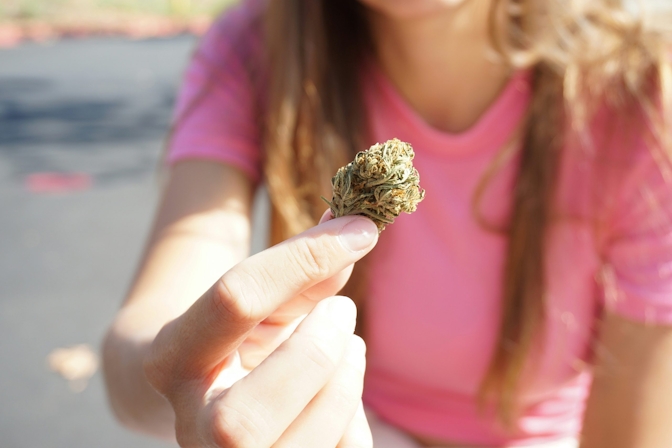
Herb
Why Some Strains Make Music Sound Better: The Science of Weed and Sonic Perception
Discover why music resonates differently when high, blending personal experience with scientific insights.
Weed and music have a long-standing connection, from jazz clubs to festival fields to solo headphone sessions. Ask most cannabis users, and they’ll tell you: music sounds extremely good when you’re high. But why is that? Science offers possible reasons, ranging from brain chemistry and sensory perception to emotional response and focus.
To understand why music sounds better high, we can look at what cannabis does to sound perception, time processing, and brain regions linked to emotion and reward. While cannabis might feel like a psychoacoustic enhancer, new research challenges that assumption and reveals a more complex interaction than we thought.
Key Takeaways

Christian Wiediger / Unsplash
- Cannabis containing CBD may offset some of THC’s dampening effects, helping maintain musical engagement.
- The strain you choose plays a big role in how you perceive and feel music while high.
- Cannabis influences how the brain processes music, but recent research shows it may dampen activity in brain regions tied to music-evoked pleasure.
- THC reduces brain response in the auditory cortex, amygdala, hippocampus, and ventral striatum; areas involved in how we emotionally experience music.
- Despite this, cannabis increases the desire to listen to music, suggesting it enhances anticipation (“wanting”) but may reduce emotional payoff (“liking”).
- THC might disrupt the body’s mesolimbic dopamine system, a natural network that helps regulate emotion and reward.
Weed and Music: What Makes a Strain Good for Listening?

jamakassi / Unsplash
Not all cannabis pairs well with music. Some strains are known for mental clarity, creative uplift, or deep focus, while others can cloud your thoughts or dull sensory detail.
Strain composition plays a major role in how you process music and cannabis together. High-THC strains may boost your urge to listen, but they may also reduce how much you emotionally connect with the sound. Strains that combine THC with CBD may help you stay focused and emotionally present while listening.
What to look for in cannabis strains for listening to music:
- Balanced cannabinoid profiles (THC + CBD)
- Mood-lifting terpenes like limonene or linalool
- Reported effects like focus, introspection, or euphoria
The Best Weed Strains for Listening to Music

Elsa Olofsson / Unsplash
Here are a few of the best strains for music, chosen for their ability to promote sensory awareness, emotional engagement, or present-moment focus:
- Blue Dream – A balanced hybrid with a reputation for creative calm; may be good for emotional or lyrical tracks.
- Lemon Haze – Uplifting and focused, may be great for high-energy music, funk, or psychedelic rock.
- Harlequin – High in CBD, mild in THC, and often described as clarifying, Harlequin may be excellent for hearing every detail.
- GMO (Garlic Cookies) – Slows things down with a heavy body buzz, may be perfect for ambient or instrumental genres.
- Jack Herer – A cerebral sativa that may enhance clarity, potentially making it ideal for complex compositions or jazz.
These are some of the best strains for listening to music if you’re looking to feel more in tune with the sound without losing the emotional or sensory nuance that makes your favorite tunes resonate.
Why Does Music Sound Better High? The Science Behind Weed and Music

Herb
On the surface, cannabis and music combined feel like a perfect match. THC alters perception, may deepen focus, and affects how your brain responds to reward. But a 2018 brain imaging study complicates the picture. When participants listened to music while high on THC, brain activity dropped in several regions tied to musical enjoyment, including the auditory cortex, amygdala, hippocampus, and ventral striatum.
In short, THC reduced the brain’s emotional response to music, even though people still wanted to listen. That gap between wanting and liking shows how cannabis may influence the way music sounds without necessarily making it feel more rewarding.
One possible reason is that THC disrupts the body’s endocannabinoid system, a network of chemical messengers that helps regulate mood and emotion. It may also reduce levels of anandamide, a compound associated with emotional reward. These shifts might blunt the emotional high of a song, even when it still sounds good. So why does music sound better high? For many cannabis users, it comes down to the strain, the setting, and how tuned in you are to the present moment.
THC Changes How the Brain Processes Sound
Sound perception starts in the auditory cortex, the part of the brain that helps interpret rhythm, pitch, and tone. THC acts on cannabinoid receptors in this region, influencing how sound is processed. While some cannabis users report sharper, more layered music sounds, brain scans suggest something more complicated.
Freeman et al. (2018) found that THC reduces activity in the auditory cortex during music listening. Another study by Winton-Brown et al. (2011) found similar results. THC lowered activity across multiple sound-processing areas on both sides of the brain. This change also affects something called sensory gating, which is your brain’s way of filtering out background noise so you can focus on what matters. THC may help you block distractions, but it may also flatten the emotional layers of what you’re hearing.
CBD, on the other hand, appears to do the opposite. Winton-Brown’s team found that it increased activity in these sound regions, which could help preserve detail and clarity. These differences between THC and CBD help explain why strain composition matters if you’re using cannabis to listen to music more intentionally.
THC and Music Both Trigger the Brain's Reward System—But Not Always in Sync
The ventral striatum, part of the brain’s reward system that releases dopamine, helps create feelings of pleasure and emotional connection. Both music and cannabis activate this area, but not always in the same way.
In Freeman’s study, THC lowered activity in the ventral striatum while participants were listening to music, even though they still wanted to hear it. That suggests cannabis may increase anticipation (wanting) without deepening the actual emotional response (liking). This pattern has been seen in other research on dopamine signaling as well.
CBD seemed to preserve the connection between the ventral striatum and auditory cortex, possibly allowing a fuller emotional experience even while high. That balance could be important for cannabis consumers who want to feel emotionally connected to their favorite songs while using weed.
THC Enhances Present-Moment Focus—Even When Pleasure Is Muted
Another reason music sounds better high for some people: cannabis alters time perception. High-THC strains can distort time, making a song feel longer or more immersive. That slowed sense of time may help you get into the present moment and focus on each beat, lyric, or transition.
Even if the emotional response is muted, the ability to fully perceive music and engage with the sound in real time might explain why so many cannabis users say music just feels better when they’re high. It’s less about the brain’s reward system lighting up and more about being dialed into the experience.
Final Thoughts

Andre Hunter / Unsplash
So, does weed make music sound better? For many cannabis consumers, yes, but it depends. THC may dampen the brain’s emotional response to music, but it also increases the desire to listen and may enhance focus and immersion in the present moment.
If you like to pair weed and music, try paying closer attention to your strain. Those with both THC and CBD may help you stay connected to what you’re hearing. As with most things cannabis, your mindset, body, and the track you’re spinning all influence the final experience.
Herb Recommended Products:










